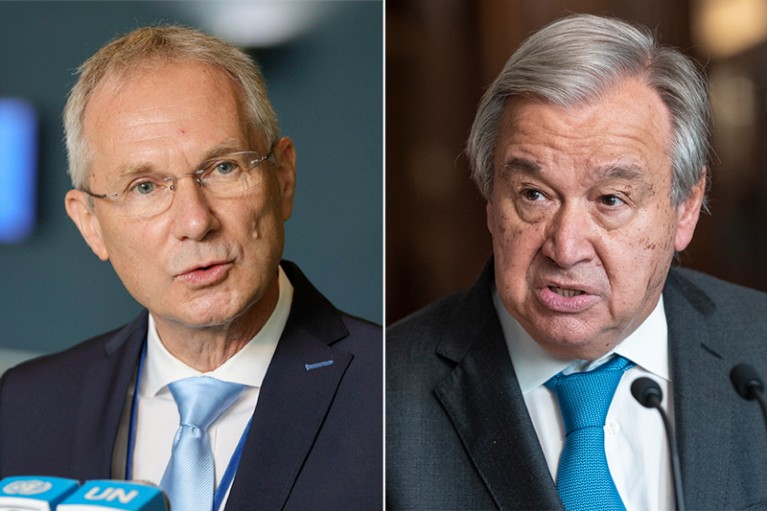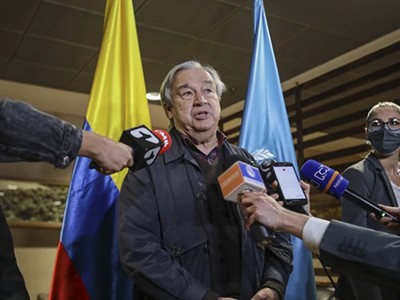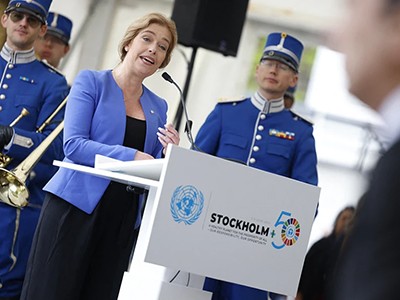
UN secretary-general António Guterres (right) and General Assembly president Csaba Kőrösi (left) must work constructively to boost research and evidence in the UN’s policymaking.Credit: Luiz Rampelotto/EuropaNewswire/DPA/Alamy, Lev Radin/Pacific Press/LightRocket/Getty
The new president of the United Nations General Assembly, Csaba Kőrösi, last month opened the body’s 77th session with a speech that signalled that science might come to play a more prominent part in the UN’s policymaking organ, at least during his tenure. Together with an earlier and more substantive move by the UN’s top diplomat, secretary--general António Guterres, this is a welcome chance for more research-informed policymaking.
First things first. Many parts of the UN system already rely heavily on scientific advice. Specialized agencies such as the World Health Organization and the UN Environment Programme employ, contract with or consult researchers at all levels. Individual UN agreements, such as the biodiversity and climate conventions, are informed by bodies that issue science advice, such as the Intergovernmental Panel on Climate Change. Worldwide, hundreds, if not thousands, of researchers are involved in studying, advising on or monitoring the Sustainable Development Goals (SDGs) — the UN’s plan for the world to cut poverty and achieve sustainability.
But science has a more limited role in the UN’s central policymaking, both in the executive arm and the legislature. A year ago, Guterres, who heads the UN’s executive branch, based in New York City, set out to change that. His agenda for his second term (2022–26) includes many science-based issues, not least the climate, a global green economy and the SDGs. His office has looked at how science-to-policy advice works in more than 90 countries and institutions, with a view to establishing a structure that fills gaps in existing scientific advice, translates science to policy effectively, and is truly relevant to decision-making.
The UN must get on with appointing its new science board
This won’t be the first time that someone in Guterres’s role has established an official science-advisory mechanism. Several models have been tried over the years. Guterres inherited a science advisory board set up by his predecessor, Ban Ki-moon. The secretary-general’s office evaluated these efforts and found that they didn’t influence decision-making or policy. The office says the next step will be to consult leaders and experts across the UN, before settling on how to shape a network of scientific advice that the secretary-general can tap on a regular basis.
Kőrösi said he wants scientists to help the General Assembly with “knowledge from microscopes to microphones”. One way to make that happen could be to establish an office or a mechanism through which assembly members can access expertise to inform their decisions, just as science offices support many national parliaments around the world. It is early days for Kőrösi’s move, and we need to see more detail — such as the names of the countries that are backing it. But there’s no doubt it will be a first for the UN’s legislature, if it can happen.
The General Assembly is akin to a parliament of countries. It sets the UN’s budget and debates and agrees resolutions on crises and conflicts. Crucially, it is separate from the executive branch (Guterres and his colleagues). It is sometimes derided as an expensive talking shop — often by people in powerful nations — but it is the one part of the UN that gives every country a voice. And this level of inclusion pays off. In 2015, it was the General Assembly (rather than a specialized agency) that signed off on the SDGs. This endorsement ensured that the goals became part of the institutional architecture of policy, business and civil society in member states.
The sustainability movement is 50. Why are world leaders ignoring it?
Kőrösi’s is not a new idea. Innovation-studies scholar Calestous Juma, one of the first executive secretaries of the UN Convention on Biological Diversity, recommended it in a landmark report 20 years ago, called Knowledge and Diplomacy: Science Advice in the United Nations System. Juma, originally from Kenya, suggested it as a way that representatives from all UN member countries could access the best available evidence ahead of their deliberations.
A key question is, who will pay? If the General Assembly sets the UN budget, could it vote to fund such an office? Often, it’s the UN’s more powerful nations that fund science. If all countries want such an office, they need to find ways to pay for it.
Some observers are concerned about duplicating the science advice that already exists in the UN, and potential clashes with Guterres’s efforts. It is undeniable that the wings of the UN system often struggle to work in concert. The two offices will need to have a constructive relationship, but they do have different roles. When the UK Parliament established a Parliamentary Office of Science and Technology, few made the argument that it would duplicate existing advice given to the UK government’s executive agencies.
For any science-advice system to be effective, both the executive and the legislative arms need to be included, says Chris Tyler, director of research and policy at University College London, and former director of the Parliamentary Office of Science and Technology. “If you want to change the weather, you deal with the executive, but if you want to change the climate, you need to talk to the legislature.”
Ideally, Guterres and Kőrösi’s initiatives will reinforce each other to create a strong, relevant voice for science at the heart of the UN’s policymaking. That will be not just welcome, but timely. The pandemic has shown the value of science and innovation. As the world grapples with food security, climate change and other pressing challenges, a strong voice is needed more than ever.

 The sustainability movement is 50. Why are world leaders ignoring it?
The sustainability movement is 50. Why are world leaders ignoring it?
 The UN must get on with appointing its new science board
The UN must get on with appointing its new science board







